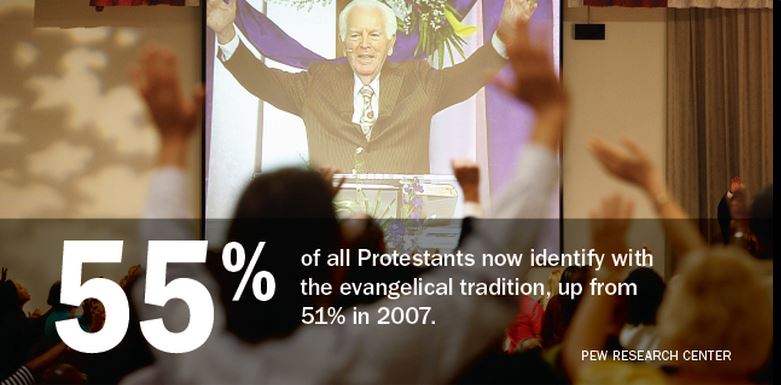A major new Pew Research report released today finds that the number of Americans identifying as Christian has shrunk since its last big survey in 2007, as the “rise of the nones” continues. While generational replacement account for some of the decline in Christian affiliations counted,
it is occurring among Americans of all ages. The same trends are seen among whites, blacks and Latinos; among both college graduates and adults with only a high school education; and among women as well as men.
The US is still home to more Christians than any other country, with around 70% of the population claiming some Christian affiliation; but that is a drop of nearly 8% from the last large Pew study in 2007. In the same period, the group claiming no religion rose by more than 6%, and those claiming other religious identities by 1.2%.
A majority of all U.S. Protestants (55%) now identify with the evangelical tradition: http://t.co/OIXTEXAkX7 pic.twitter.com/9O5oTb3tyQ
— PewResearch Religion (@PewReligion) May 12, 2015
The Pew press release gives a summary of some key findings. The front page of the full report gives a fuller overview, and all of the details, including the questionnaires used to collect the data, and interactive tables for exploring the findings, are available here. Among the key conclusions offered in the press release:
- Christians probably have lost ground not only in their relative share of the U.S. population but also in absolute numbers.
- American Christians – like the U.S. population as a whole – are becoming more racially and ethnically diverse.
- Religious intermarriage appears to be on the rise.
- While many U.S. religious groups are aging, the unaffiliated are comparatively young – and getting younger, on average, over time.
- Switching religion is a common occurrence in the United States.
- Christianity – and especially Catholicism – has been losing more adherents through religious switching than it has been gaining.
- The evangelical Protestant tradition is the only major Christian group in the survey that has gained more members than it has lost through religious switching.
- The Christian share of the population is declining and the religiously unaffiliated share is growing in all four major geographic regions of the country.
- Whites continue to be more likely than both blacks and Hispanics to identify as religiously unaffiliated.
The findings came from telephone interviews with 35,071 adults across the United States conducted in 2014.
Were you one of them? What has your experience been of the changing religious landscape where you live?
Posted by Rosalind Hughes

